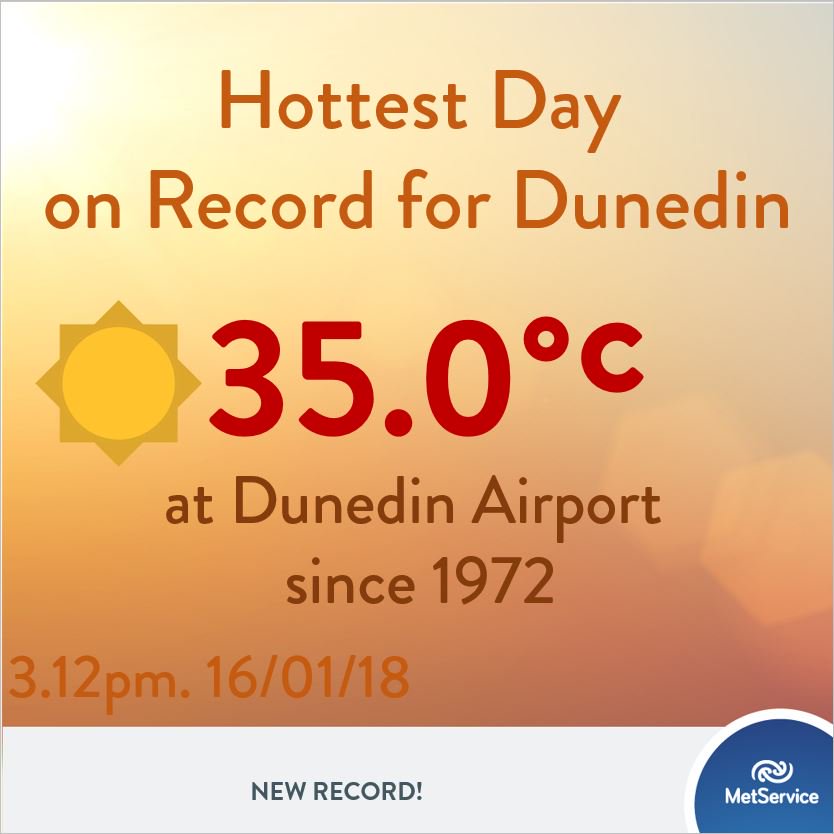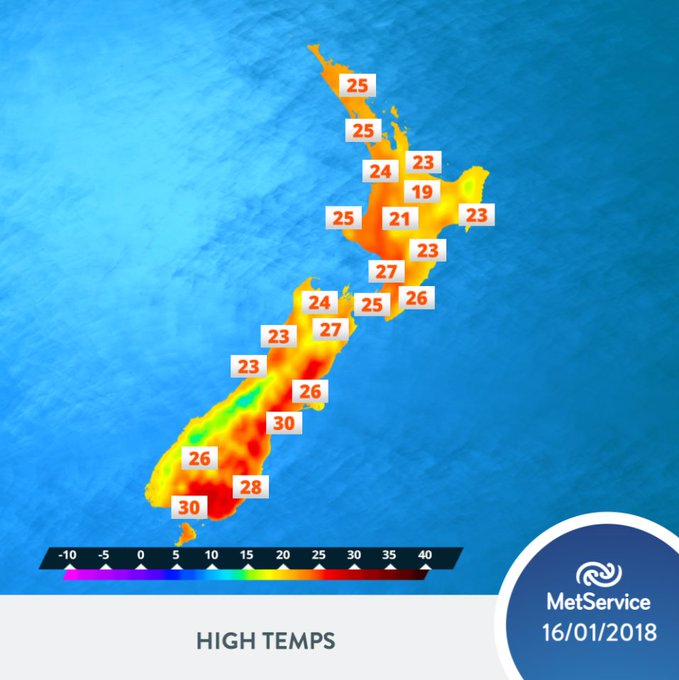Unmentioned
anywhere in the media but I'm sure Lower Hutt has seen a record,
certainly in weather that goes down.
It
has not gone down lower than 18C (about the average) in almost two
months.
You
know what they say about the English and the weather. Now it's almost
a taboo story.
Climate
certainly is.
Here's
what they say:
“Throughout
the month of January daytime temperatures will generally reach highs
of around 20°C that's about 69°F. At night the average minimum
temperature drops down to around 14°C, that's 57°F.
"In
recent times the highest recorded temperature in January has been
28°C that's 82°F, with the lowest recorded temperature 1°C, about
33°F.
Our weather station at Dunedin Airport recorded 35C at 3.12pm today (minute data), which would make this the hottest day on record for Dunedin Airport since records began in 1972. ^Lisa
16
January, 2018
Southern
New Zealand cities sweltered in temperatures above 30C yesterday but
cooler temperatures are forecast in the coming days as rain and windy
weather sweep the country.
However,
eastern regions of the South Island will have little reprieve as the
heat continues to bear down. A total fire ban is in force for Otago
and Southland, among other areas.
In
the north, Lower Hutt hit a sweltering 31.5C yesterday, with the
capital at a more balmy 27.8C, which MetService meteorologist Brian
Mercey called unusually high for this time of year.
Down
south, Dunedin Airport soared to a high of 33.9C, the fourth-highest
recorded temperature for the city. The record was set in 2004 at
34.6C.
Alexandra
hit 31.3C and Wanaka hit 30C yesterday. The tiny settlement of
Edievale, south of Roxburgh in Otago, was absolutely scorching at
35C.
Auckland
and Hamilton were much cooler at 26C, Tauranga at 24C, and Rotorua a
"chilly" 22C.
Mercey
said the south would have temperatures in the 30s again today but it
would feel cooler thanks to a breeze and it would cool down even
further tomorrow.
The
hot weather resulted in a significant drop in the flow of the
Whitestone River in Fiordland, prompting Fish and Game Southland to
rescue fish including brown and rainbow trout, adult lampreys, upland
bullies and long-fin eels yesterday afternoon which were marked to be
released further down the catchment, Fairfax Media reported.
MetService
meteorologist Tui McInnes said once a low pressure system reached the
country it would spread a "front across the country bringing
plenty of moisture and decent amounts of rainfall for some places".
Tomorrow western parts of both islands are expected to have rain,
with Nelson, Westland and Taranaki the wettest.
A
severe weather watch is in place for heavy rain for Westland and
Nelson, with the possibility of more regions being added.
While
it looked to be a wet week for many, eastern regions in the South
Island remained sheltered by the Southern Alps, McInnes said.
Fire
and Emergency New Zealand rural regional manager Mike Grant said
conditions had been incredibly dry in the south, and soil moisture
levels were very low.
"We've
had a few millimetres of rain here and there over the past six weeks,
but the grass and vegetation is still tinder dry.
"That
coupled with the extremely hot weather we've been having means the
fire danger is really high. We had an unprecedented run of hot
weather lately, certainly for Invercargill the heat has been
record-breaking," Grant said.
A
total fire ban remained in place for Gisborne, Horowhenua, Rangitikei
and Marlborough.
On
Thursday most of the North Island will have rain but the wet weather
will begin to ease by Friday.
Today's
forecast
Whangarei:
Cloudy
with showers, High 25C Low 20C.
Auckland:
Cloudy with showers, High 25C Low 19C.
Hamilton:
Fine with morning cloud, High 24C Low 17C
Tauranga:
Cloudy with showers, High 23C Low 19C
Wellington:
Cloud with showers then fine, High 25C Low 16C
Christchurch:
Morning cloud then fine, High 26C Low 16C
Dunedin:
Fine then showers in afternoon, possibly heavy, High 28C Low 18C
Dunedin's hottest day
Dunedin
is officially having its hottest day on record, hitting 35 degrees
celsius.
16 January, 2018
MetService forecaster
Cameron Coutts said the heat was recorded at the airport at 3.12pm
today.
The city's previous
hottest day was 34.9°C, and its previous hottest January day was
34.7°.
Records go back to 1972.
Mr Coutts said Dunedin
was the hottest place in the country today, but noted the city would
be slightly cooler than at the airport.
Southern District Health
Board made a plea yesterday for people to keep cool, when 30 people
went to hospital after the mercury hit 32.3° in Invercargill, its
hottest on record.
Deputy chief medical
officer Dr Tim Mackay said Invercargill had another eight people show
up in hospital because of the heat today, mostly children with
sunburns.
"So it's just about
making sure that kids get some sunscreen on," he said.
"One of the other
problems that tends to happen now when you've had a couple of hot
nights is it can start to affect the elderly so it's best to keep an
eye on older people."
The hot and dry weather
is driving river levels in Otago to new lows, with one site in the
region at its lowest since records began in 1982.
NIWA's drought index
shows the district is "extremely dry", with temperatures
hitting 33° in Alexandra today.
Otago Regional Council
manager of environmental services Martin King told RNZ the low flows
were starting to hurt the environment and the local community.
MetService is predicting
some rain for Thursday but Mr King said the region needed a more
sustained downpour to help replenish the rivers in a sustainable way.
Compulsory restrictions
may be enforced if residents did not conserve water, the council
said.
Council water manager Tom
Dyer said water levels in the city's catchments were dropping while
demand was increasing.
If rain did not fall this
week and demand continued, the city would need to move to the first
level of compulsory restrictions before the weekend.
Voluntary restrictions
have been in place in the city since early December, but water use is
now more than 35 percent above normal.
Dr Mackay urged people to
drink at least two litres of water per day, use their heat pumps for
air-conditioning or get cool, damp towels on the backs of people's
necks to cool them down.
"Dehydration can
occur quite quickly, and with these hot conditions being less common
in Southland, it's possible people are not as quick to pick up on the
symptoms," he said.
"We ask people to de
particularly careful about the effects of drinking alcohol in the hot
weather. Far from quenching your thirst it will speed up dehydration,
and can be quite serious."
Fire and Emergency have
imposed a total fire ban across Otago from midnight on Monday.







 Another warm day in store for many tomorrow!
Another warm day in store for many tomorrow! 
No comments:
Post a Comment
Note: only a member of this blog may post a comment.